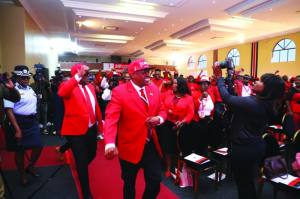TONOTA: However, unfortunately, some of our colleges of education have, in recent years, closed down – Lobatse and Francistown being examples. And in those remaining colleges, intake of students has been cut back resulting in much smaller class sizes and lecturer teaching loads.
One reason given for the development is that we now have sufficient teachers in our schools. Yes, that might be true if classes continue to be overcrowded with numbers of students of classes exceeding 40 being the norm. This is a pity since teachers are the backbone of the education sector and classes need to be smaller in order for effective teaching to take place.
I have lectured at Tonota College of Education (TCE) for several years. Here students are trained specifically to teach in our junior secondary schools. Twenty years ago, Year Three students would know, before they left college where they would be posted the following January. But these days, it is a different story – graduates now have to compete with each other for the few jobs available. The best that most graduates can hope for now is a temporary teaching post at a junior secondary school where a teacher might, for example, be on maternity leave. So, the message is clear – we need to reduce class sizes and so employ those graduates who are at present without a permanent job! Our student teachers are unemployed, not because their training was irrelevant to the needs of the education system, but rather for other reasons.
In fact, the DSE and DPE courses are very relevant to the needs of teachers in school. For example, the DSE has core courses such as the theory of education and communication and study skills.
Students also choose two teaching subjects that they might like to teach in schools; in each, they are taught subject content and professional studies, which deal with teaching skills in the chosen subject. Time is also spent on teaching practice where students can practise their teaching skills at a junior secondary school.
The DSE course compares very favourably with teacher training courses elsewhere; in fact, I can truly say that I learnt much more about teaching whilst a lecturer at TCE than when I was studying at the University of London in the UK for my Postgraduate Certificate in Education (PGCE)! However, I do feel that more time could be spent on teaching practice during the DSE programme. After all, the core business of teachers is to teach in the classroom! During my one-year PGCE course, which consisted of three semesters, one semester was given over entirely to teaching practice – that’s one third of the course duration, and it was time well spent!
I believe strongly that a course on basic First Aid should be mandatory for all students at colleges of education; one reason for this is that teachers get into contact with hundreds of students each day and also some schools may be located in remote rural areas where medical facilities may be limited. And such knowledge can then be passed onto secondary school students in their Combined Science and Biology courses.
And the importance that I attach to such a course comes from personal experience! These days we see so many traffic accidents in Botswana. But accidents attract hordes of passersby who end up being just spectators and who are not able to assist those who are injured. In some cases, some basic First Aid can save life. During my PGCE course, I took a First Aid course that was offered by the university. It was time well spent and, as time would tell, was probably the most useful course that I pursued there!
On completion of my PGCE, I worked as a teacher in Jamaica. During one half term break, I was travelling from Kingston to Montego Bay, a tourist resort on the north coast. Some kilometres out of Montego Bay, we heard a mighty bang outside the train – the train had collided with a bakkie that was crossing the track (the driver of the bakkie could easily see the train coming and decided to beat the train, but with fatal results). The bakkie was catapulted into the air and the two passengers in front died on the spot when the bakkie hit the ground and burst into flames. Meanwhile, the two other passengers at the back of the bakkie were thrown out and landed some distance away from the burning truck.
Passengers rushed to the scene but no one could assist in any meaningful way. Except me. I went forward and saw that a man and women lying on the ground. I could see that the man was choking with blood and gasping for air.
From my First Aid course, I knew that his airway was blocked and if a person cannot breathe for four minutes, then he’s as good as dead. I quickly took off my shirt and pushed it down his throat to remove the blood. Once his airway was clear, I then put him in a recovery position so that it would remain clear; again, something that I had learnt before.
The man survived. Now if I had not done that course, I would not have known what to do; like the rest of the crowd I would have been just another spectator!
The injured woman just lay on the ground, silent. Then, I learnt from the course that the quiet ones are often more seriously injured. And it proved to be so in this case. I noticed that she was not breathing so I gave her artificial respiration. I soon observed that one lung was inhaling and exhaling normally, but the other was not exhaling, as it should. Immediately I came to the conclusion that the lung had been punctured during the accident; again, something that I had learnt in that First Aid course! She was seriously injured. An ambulance finally arrived, we put her in at the back and I continued to give her artificial respiration until we arrived at the hospital in Montego Bay. Although I had kept her alive up to now, she passed away in front of us on the operating table even after being given an adrenaline shot. Some weeks later, the hospital wrote to me saying that my diagnosis of the woman was as I had thought – a punctured lung – and given the time in getting to the hospital, it would have been unlikely that her life could have been spared.
Tertiary institutions also need to focus more on those students who have artistic and creative talents. For example, courses in architecture, design and fashion – let us produce our very own fashion designers who can run fashion shows displaying creative and exciting new designs, not only here, but also on the international stage. So, let us see those catwalks showing off our local talent.
Although courses in media and film (for example, Broadcasting and Journalism, and Media Studies) are offered at the University of Botswana (UB) and Limkokwing, more students, perhaps, could be encouraged to enrol in them. Rather than being fed a diet of monotonous American and South African soaps, such as Dallas and Queen, let us make more of our own. The Btv series, Itshireletse and Pelokgale, clearly show that there are many locals who have ability in acting and we have to nurture it. Of course, we have to start small but perhaps one day we can compete with the Nollywood film industry in Nigeria, the second largest in the world after Hollywood! And musicians and actors have the opportunity to show off their talents at Maitisong, at Maru-a-Pula school in Gaborone.
Recently, President Mokgweetsi Masisi told Batswana that the arts are critical to the economic development of local communities and the country and hence can create jobs. For this reason, the Economic Recovery and Transformation Plan (ERTP) will target local film, programme and documentary producers. And government will soon spend P52 million in refurbishing the Mass Media Complex, which will become a production hub for local television and film productions.
The needs of those less academically gifted must also be met after they leave school. The Brigades and Vocational Training Centres (VTCs) have, to some extent, met the needs of such by offering courses such as painting, welding, bricklaying, carpentry, dressmaking and others. Graduates should then be able to find work in industry as decorators, welders, bricklayers, and auto mechanics... Or to set up their own businesses.
But the quality of training may need to be improved. In many service garages, auto mechanics may not be able to diagnose common problems in a customer’s car or even be able to carry out simple repairs. I once knew a German lecturer who taught auto mechanics at one VTC. He told me that his students loathed and resented doing practical work on cars; they simply did not like getting their hands dirty! Such a poor attitude might result from the type of education system that Botswana inherited from colonial times.
This focused, to a large extent, on producing white-collar workers and office clerks. Now that’s an issue of concern since auto mechanics spend all their time on the job working with their hands. So, such institutions need to inculcate a culture of practical work in their courses.
At present, very few Brigades offer Agriculture and yet this is an area which the government says we should be focusing on now during the COVID-19 pandemic given the travel restrictions and possibility of lockdowns and closure of borders. Put simply, we need to feed ourselves more and so reduce our annual food bill of P7 billion! But, at present, only the Gabane Brigade runs courses in vegetable production (the gardens are at Kumakwane). The courses offered here are very practical and hands-on. Students grow a variety of crops in long plots and are regularly assessed. In addition, they also attend courses in Mathematics, which will help them to keep good records when they are later employed on farms, or become farmers themselves.
Agriculture has the potential to help drive and diversify our economy and was one of the few sectors of the economy, which registered positive growth in 2020.
Many tertiary institutions are now offering courses in Early Childhood Education. This is a welcome development since many educationists believe that young children can learn a lot from an early age and pre-school education can provide a good foundation for learning knowledge and skills at primary school. And most Standard 1 teachers would agree that it is easier to teach pupils at this level who have already attended pre-school before. In order to assist low-income families, government should establish and run preschool facilities since, at present, most preschools are privately owned.
*Grahame McLeod is a retired
educationist
Colleges of education train students to be the future teachers of the nation; here they study for the Diploma in Secondary or Primary Education (DSE/DPE), writes GRAHAME MCLEOD*







